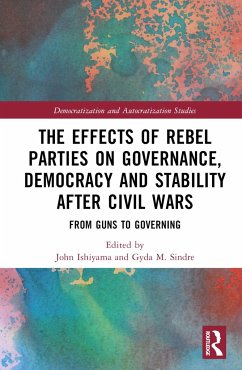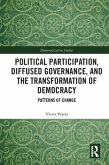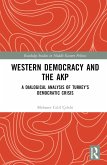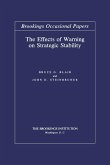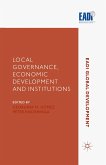The Effects of Rebel Parties on Governance, Democracy and Stability after Civil Wars
From Guns to Governing
Herausgeber: Ishiyama, John; Sindre, Gyda M
The Effects of Rebel Parties on Governance, Democracy and Stability after Civil Wars
From Guns to Governing
Herausgeber: Ishiyama, John; Sindre, Gyda M
- Gebundenes Buch
- Merkliste
- Auf die Merkliste
- Bewerten Bewerten
- Teilen
- Produkt teilen
- Produkterinnerung
- Produkterinnerung
This book provides a systematic overview and in-depth analysis of the effects of rebel group inclusion on democracy following the end of conflict across the globe.
Andere Kunden interessierten sich auch für
![The Effects of Rebel Parties on Governance, Democracy and Stability after Civil Wars The Effects of Rebel Parties on Governance, Democracy and Stability after Civil Wars]() The Effects of Rebel Parties on Governance, Democracy and Stability after Civil Wars66,99 €
The Effects of Rebel Parties on Governance, Democracy and Stability after Civil Wars66,99 €![Political Participation, Diffused Governance, and the Transformation of Democracy Political Participation, Diffused Governance, and the Transformation of Democracy]() Yvette PetersPolitical Participation, Diffused Governance, and the Transformation of Democracy204,99 €
Yvette PetersPolitical Participation, Diffused Governance, and the Transformation of Democracy204,99 €![Globalising Democracy Globalising Democracy]() Peter Burnell (ed.)Globalising Democracy140,99 €
Peter Burnell (ed.)Globalising Democracy140,99 €![The Effects of Wars The Effects of Wars]() The Effects of Wars206,99 €
The Effects of Wars206,99 €![Western Democracy and the AKP Western Democracy and the AKP]() Mehmet Celil ÇelebiWestern Democracy and the AKP180,99 €
Mehmet Celil ÇelebiWestern Democracy and the AKP180,99 €![The Effects of Warning on Strategic Stability The Effects of Warning on Strategic Stability]() Bruce G. BlairThe Effects of Warning on Strategic Stability18,99 €
Bruce G. BlairThe Effects of Warning on Strategic Stability18,99 €![Local Governance, Economic Development and Institutions Local Governance, Economic Development and Institutions]() Local Governance, Economic Development and Institutions41,99 €
Local Governance, Economic Development and Institutions41,99 €-
-
-
This book provides a systematic overview and in-depth analysis of the effects of rebel group inclusion on democracy following the end of conflict across the globe.
Hinweis: Dieser Artikel kann nur an eine deutsche Lieferadresse ausgeliefert werden.
Hinweis: Dieser Artikel kann nur an eine deutsche Lieferadresse ausgeliefert werden.
Produktdetails
- Produktdetails
- Verlag: Taylor & Francis
- Seitenzahl: 276
- Erscheinungstermin: 30. November 2022
- Englisch
- Abmessung: 234mm x 156mm x 18mm
- Gewicht: 590g
- ISBN-13: 9781032184081
- ISBN-10: 1032184086
- Artikelnr.: 64663841
- Herstellerkennzeichnung
- Libri GmbH
- Europaallee 1
- 36244 Bad Hersfeld
- gpsr@libri.de
- Verlag: Taylor & Francis
- Seitenzahl: 276
- Erscheinungstermin: 30. November 2022
- Englisch
- Abmessung: 234mm x 156mm x 18mm
- Gewicht: 590g
- ISBN-13: 9781032184081
- ISBN-10: 1032184086
- Artikelnr.: 64663841
- Herstellerkennzeichnung
- Libri GmbH
- Europaallee 1
- 36244 Bad Hersfeld
- gpsr@libri.de
John Ishiyama is a University Distinguished Research Professor of Political Science at the University of North Texas, USA. Gyda M. Sindre is an Associate Professor in International Politics at the University of York, UK.
1. Introduction: Rebel group inclusion and post-war democratisation Part 1:
Rebel group inclusion and good governance 2. The Effects of Rebel Parties
on Governance: Organizational Endowments, Ideology, and Governance after
Civil Wars End 3. Dynamics of post-rebel party governance in Aceh and East
Timor: Balancing patronage politics and popular democracy 4. From 'Rebel
Justice' to the 'Rule-of-Law': The cases of Hamas and Hezbollah 5. The
Struggle for Political Stability and Governance in Northern Ireland after
the Peace Process: The role of Sinn Féin and the IRA 6. The KLA successor
parties and the spoils of peace in Kosovo Part 2: Rebel group inclusion and
democracy 7. How does the inclusion of post-rebel parties shape democracy?
Parties, elections and peace in Mozambique, 1992-2018 8. The Political
Integration of Islamist Armed Groups: A Viable Path to Peace and Democracy?
9. Adapting too well? Rebel reconversion and democratization in El Salvador
10. Post-War Ruling Parties and their Youth Wings: How Old Rebels handle
the African Millennials 11. Rebel Participation and Political Transition in
Post-War Sri Lanka Part 3: Rebel group inclusion and political stability
12. Political Parties in De Facto States: Links with External Patrons 13.
The Ethiopian People's Revolutionary Democratic Front: Coalition Dynamics
and Post-War Politics 14. Contingency, Inclusion, and Democracy: A Critical
Analysis of Jamyat-e- Islami in the Afghan State Building Process 15.
Virtual Politics, post-Islamism and authoritarian Inertia in post-conflict
Tajikistan 16. Conclusion: Towards a theory of rebel group inclusion and
democratisation
Rebel group inclusion and good governance 2. The Effects of Rebel Parties
on Governance: Organizational Endowments, Ideology, and Governance after
Civil Wars End 3. Dynamics of post-rebel party governance in Aceh and East
Timor: Balancing patronage politics and popular democracy 4. From 'Rebel
Justice' to the 'Rule-of-Law': The cases of Hamas and Hezbollah 5. The
Struggle for Political Stability and Governance in Northern Ireland after
the Peace Process: The role of Sinn Féin and the IRA 6. The KLA successor
parties and the spoils of peace in Kosovo Part 2: Rebel group inclusion and
democracy 7. How does the inclusion of post-rebel parties shape democracy?
Parties, elections and peace in Mozambique, 1992-2018 8. The Political
Integration of Islamist Armed Groups: A Viable Path to Peace and Democracy?
9. Adapting too well? Rebel reconversion and democratization in El Salvador
10. Post-War Ruling Parties and their Youth Wings: How Old Rebels handle
the African Millennials 11. Rebel Participation and Political Transition in
Post-War Sri Lanka Part 3: Rebel group inclusion and political stability
12. Political Parties in De Facto States: Links with External Patrons 13.
The Ethiopian People's Revolutionary Democratic Front: Coalition Dynamics
and Post-War Politics 14. Contingency, Inclusion, and Democracy: A Critical
Analysis of Jamyat-e- Islami in the Afghan State Building Process 15.
Virtual Politics, post-Islamism and authoritarian Inertia in post-conflict
Tajikistan 16. Conclusion: Towards a theory of rebel group inclusion and
democratisation
1. Introduction: Rebel group inclusion and post-war democratisation Part 1:
Rebel group inclusion and good governance 2. The Effects of Rebel Parties
on Governance: Organizational Endowments, Ideology, and Governance after
Civil Wars End 3. Dynamics of post-rebel party governance in Aceh and East
Timor: Balancing patronage politics and popular democracy 4. From 'Rebel
Justice' to the 'Rule-of-Law': The cases of Hamas and Hezbollah 5. The
Struggle for Political Stability and Governance in Northern Ireland after
the Peace Process: The role of Sinn Féin and the IRA 6. The KLA successor
parties and the spoils of peace in Kosovo Part 2: Rebel group inclusion and
democracy 7. How does the inclusion of post-rebel parties shape democracy?
Parties, elections and peace in Mozambique, 1992-2018 8. The Political
Integration of Islamist Armed Groups: A Viable Path to Peace and Democracy?
9. Adapting too well? Rebel reconversion and democratization in El Salvador
10. Post-War Ruling Parties and their Youth Wings: How Old Rebels handle
the African Millennials 11. Rebel Participation and Political Transition in
Post-War Sri Lanka Part 3: Rebel group inclusion and political stability
12. Political Parties in De Facto States: Links with External Patrons 13.
The Ethiopian People's Revolutionary Democratic Front: Coalition Dynamics
and Post-War Politics 14. Contingency, Inclusion, and Democracy: A Critical
Analysis of Jamyat-e- Islami in the Afghan State Building Process 15.
Virtual Politics, post-Islamism and authoritarian Inertia in post-conflict
Tajikistan 16. Conclusion: Towards a theory of rebel group inclusion and
democratisation
Rebel group inclusion and good governance 2. The Effects of Rebel Parties
on Governance: Organizational Endowments, Ideology, and Governance after
Civil Wars End 3. Dynamics of post-rebel party governance in Aceh and East
Timor: Balancing patronage politics and popular democracy 4. From 'Rebel
Justice' to the 'Rule-of-Law': The cases of Hamas and Hezbollah 5. The
Struggle for Political Stability and Governance in Northern Ireland after
the Peace Process: The role of Sinn Féin and the IRA 6. The KLA successor
parties and the spoils of peace in Kosovo Part 2: Rebel group inclusion and
democracy 7. How does the inclusion of post-rebel parties shape democracy?
Parties, elections and peace in Mozambique, 1992-2018 8. The Political
Integration of Islamist Armed Groups: A Viable Path to Peace and Democracy?
9. Adapting too well? Rebel reconversion and democratization in El Salvador
10. Post-War Ruling Parties and their Youth Wings: How Old Rebels handle
the African Millennials 11. Rebel Participation and Political Transition in
Post-War Sri Lanka Part 3: Rebel group inclusion and political stability
12. Political Parties in De Facto States: Links with External Patrons 13.
The Ethiopian People's Revolutionary Democratic Front: Coalition Dynamics
and Post-War Politics 14. Contingency, Inclusion, and Democracy: A Critical
Analysis of Jamyat-e- Islami in the Afghan State Building Process 15.
Virtual Politics, post-Islamism and authoritarian Inertia in post-conflict
Tajikistan 16. Conclusion: Towards a theory of rebel group inclusion and
democratisation

